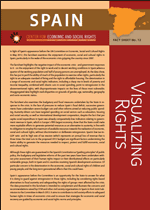Spain: Human rights, casualties of socializing the costs of the crisis
Published on Wed, 2012-05-16 09:26
The danger of policy measures designed to socialize the costs of the crisis have become painfully apparent in Spain, where the impacts of successive austerity budgets have resulted in deteriorating outcomes across a broad spectrum of human rights indicators, warned the Center for Economic and Social Rights (CESR) in a parallel report coordinated with 18 civil society groups for the UN Committee on Economic, Social and Cultural Rights’ 48th session, held earlier this month in Geneva. As the spectre of a double-dip recession continues to spread across Europe, economic and social rights are coming under increasing pressure in Spain. Spanish families have seen their wellbeing undermined by a series of reforms, implemented by both the recently-elected Popular Party and their Socialist Party predecessors, remarked the parallel study. Spain stood before the UN Committee for the first time in eight years, and the civil society’s report challenged the government to demonstrate if it has done everything possible to respect, protect and fulfill the economic and social rights of ordinary people. The report elucidates the impact of austerity measures on human rights. With experts predicting that the unemployment rate – the highest in the developed world at 23 per cent – will continue to rise for the foreseeable future, workers are becoming increasingly desperate, wrote the authors. This discontent made headlines around the world on March 29 when a general strike severely disrupted the transport and manufacturing sectors and close to a million people took to the streets of cities and towns across the country to voice their frustration at labor reforms. Youth unemployment is now approaching 50 per cent, and the situation of vulnerable groups is likely to be prejudiced again by the 2012 budget, which demands further cuts of 15 per cent in government spending in order to keep pace with deficit reduction targets. All the while, the impacts of unemployment, job precarity, reduced income and reduced social benefits on ordinary households are becoming ever more apparent, with over a million people being forced into poverty between 2009 and 2010. According to Eurostat figures, more than a quarter of the population is now are risk of poverty and exclusion – the figure is even higher among children – while inequality levels are rising faster than any other European nation. According to the report, the Spanish government must remember that it is required to take corrective steps immediately when retrogressions in economic and social rights are identified. CESR, together with Amnesty International Spain and Observatori DESC, sent Prime Minister Mariano Rajoy a joint letter when he assumed leadership of the country earlier this year, to remind him of his human rights obligations in the light of the crisis. The fact sheet This factsheet examines the enjoyment of economic, social and cultural rights in Spain since the economic crisis took hold of the country in 2007. It highlights the negative impact of the economic crisis – and government responses to it – on the enjoyment of the right to work and to decent working conditions in Spain, where a quarter of the working population and half of young persons are unemployed. As the data shows, this has put in peril the ability of much of the population to exercise other rights, particularly the right to an adequate standard of living and the right to affordable housing. Deterioration in a range of economic and social rights indicators, including a sharp rise in levels of poverty and income inequality, combined with drastic cuts in social spending, point to retrogression in the abovementioned rights, with disproportionate impacts on the lives of those most vulnerable. Disaggregated data highlight stark disparities on grounds of gender, age, nationality, geography and socio-economic status. Budgetary and fiscal measures undertaken by the State in response to the crisis are also analysed. In the face of pressures to reduce Spain´s fiscal deficit, successive governments have undertaken severe budget cuts and other reforms aimed at reducing public spending. Austerity-driven cuts have targeted spending on social sectors such as education, housing and social security, as well as international development cooperation, despite the fact that per capita social expenditure in Spain was already comparatively low. Indicators relating to government revenue in Spain, which is Europe´s fifth largest economy, show that the State could make more equitable efforts to generate potential resources as an alternative to austerity, in line with its obligation to employ the maximum of available resources towards the realization of economic, social and cultural rights, without discrimination or deliberate retrogression. Spain’s low tax-to-GDP ratio and its high rate of tax evasion are significant factors undermining the State’s ability to generate the resources needed to respect, protect and fulfill economic, social and cultural rights. Although these rights are guaranteed in the Spanish Constitution as “guiding principles” of public policy, the budgetary and legislative reforms of the past two years have been undertaken without prior assessment of their human rights impact or their distributional effects on particularly vulnerable groups, both in Spain and in countries receiving Spanish development assistance. Of particular concern is the deterioration in the economic, social and cultural rights of children and young people, and the long-term generational effects that this could have. The data presented in this factsheet complemented and illustrated the concerns and recommendations the CESR and other civil society organizations in Spain raised in their Joint Submission to the UN Committee in March 2012. More information Sources
|
SUSCRIBE TO OUR NEWSLETTER



